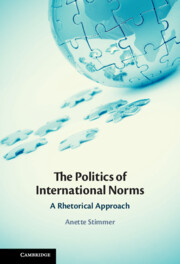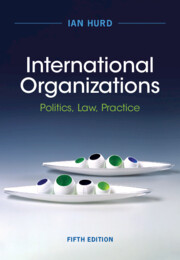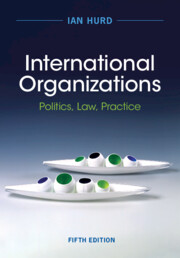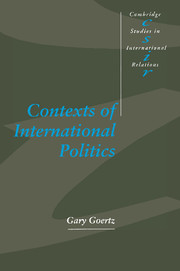The Politics of International Norms
Norm contestation is prevalent in international affairs: Legal ambiguities and tensions generate debate, even when well-established international norms are applied to concrete situations. This book discusses a wide range of norm disputes and develops a rhetorical approach to the politics of international norms. Anette Stimmer demonstrates how actors can agree or disagree on the norm frame (norm-based justification) and/or behavioural claim (implementing action) when applying international law. Thus, norm contestation can have four “alternate endings”: norm impasse, norm neglect, norm recognition, and norm clarification. These alternate endings affect the clarity and strength of the contested norms, as well as subsequent debate, differently. Furthermore, Stimmer explains how the three elements of rhetoric – speakers (including delegation to agents), argumentation, and audience reactions – influence the duration and outcome of contestation. This rhetorical approach is applied to eight norm disputes, ranging from military interventions to contestation over the human rights of terror suspects.
- Includes in-depth analysis of eight norm disputes in the post-Cold War Era, showing how their outcomes can differ and what explains these differences
- Develops a theory of 'alternate endings' of norm contestation, improving our understanding of how contestation affects the strength of norms
- Focuses on three elements of rhetoric when analysing norm contestation: argumentation; audience reactions; and speakers (including delegation to agents), making the analysis of social dynamics that perpetuate norm contestation or lead to norm change more accessible
Reviews & endorsements
‘Anette Stimmer's volume is a valuable contribution to the literature on norm contestation. Through eight perceptive case studies, she constructs a typology of ‘alternate endings' to debates on high profile security incidents. Theoretically rich and empirically grounded, both international relations and international legal scholars will benefit from her insights.' Ian Johnstone, Professor of International Law, The Fletcher School, Tufts University
‘Anette Stimmer introduces a research programme to capture strategic norm contestation based on the typology of ‘alternate endings' when studying disputes over ‘hard' legal norms in international politics. By succinctly introducing the language of constructivist norms research to more principal-agent minded scholars this exceedingly well-written book also succeeds in establishing new middle-ground in International Relations. A must-read for students of International Law and IR alike!' Antje Wiener, Professor of Political Science & Law, University of Hamburg and By-Fellow Hughes Hall, University of Cambridge
‘This book unpacks different pathways of norm contestation. Most importantly, it analyzes combinations of frame and claim contestation, and how they affect the precision and scope of international norms. Based on eight rich and detailed case studies, it offers a central framework for understanding international contestation dynamics.' Lisbeth Zimmermann, Professor of International Relations, Goethe University Frankfurt
Product details
February 2025Adobe eBook Reader
9781009455466
0 pages
This ISBN is for an eBook version which is distributed on our behalf by a third party.
Table of Contents
- Introduction
- 1. Alternate endings of norm contestation
- 2. Persistence of alternate endings: argumentation, audience reactions and delegation to agents
- 3. Norm impasse: contested statehoods of Kosovo, South Ossetia and Abkhazia (territorial integrity vs. self-determination)
- 4. Norm neglect:
- 2011 Libya no-fly zone (R2P, PoC vs. sovereignty) and South China Sea dispute (UNCLOS, 2016 arbitral award vs. nine-dash line, four sha)
- 5. Norm recognition:
- 2003 Iraq war (chapter VII norms) and targeted sanctions (due process rights)
- 6. Norm Clarification: international terrorism (right to self-defense and torture prohibition)
- Conclusion
- Bibliography.










